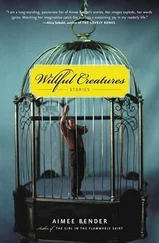Music exploded from a band gathered near the stage. The audience clapped along. “Let’s hear where everyone’s from, all at once!” the cruise director called. The room rang with hundreds of voices. Los Angeles. Palm Springs. Ottawa. Denver. Orlando. New York. “Welcome aboard!” the cruise director called. “Time to relax. Shake off those fancy duds. We want to make you a deal. We need a pair of pants. Someone take off a pair! We’ll give you fifty dollars! Come on, you’ll never see these people again in your life!”
Ginger did not know what to tell the girl, and the sorrow in her eyes was unnerving. Instead, Ginger turned her attention to the stage. She used to love crowds, the way the people in them became one roar, one sound. But now, for the first time, all the people appeared vulnerable to her. Passengers drifted onto the stage, performing various tricks: singing “God Bless America,” attempting to juggle, dancing the rumba. They wanted to take off their pants in front of each other, or scream out the names of their home cities; they were confused about their place in the world. They had everything in common with her.
Yet everyone on the stage also looked pleased to be up there, happy to be briefly bathed in light. They smiled at the sound of cheering, their faces simple in their hunger for recognition. She did not know what to tell Darlene, and then she envied everyone on the stage. She wanted to be with the others, to have a talent, to simply stand in the clear white light.
Ginger raised her hand. The cruise director called on her, and she made her way to the stage. The lights glared hard and white in her eyes. Clutching her velvet purse, she felt the weight of her money in it. “Passengers,” she called. They stood like sad soldiers before their futures.
“My name is Ginger Klein, and I’m going to make you rich. Give me a dollar,” she called. “Everyone. A dollar.”
They dug into their pockets, and a few brought dollars out. She enjoyed watching them obey her. But what was the next step?
“Catch,” she called.
She reached into her purse and pulled out a handful of bills. She threw them into the spangled darkness. There were screams of disbelief, laughter. She dug into her purse and tossed out more. The passengers leapt from their seats and dove for the money. They were unhinged, thrilled, alive. Their screams of joy blossomed inside her. Her purse grew lighter and lighter.
After awhile, the cruise director strode onto the stage and gently moved her off. “Thank you, Ginger Klein!” he shouted. “Best talent of the night, huh?” She paused, wanting to tell them something more, but she did not know what it would be. Applause thundered in her chest; she had, somehow, been successful. She walked slowly down the stairs, looking for Darlene. “Darlene,” she said, softly, then louder. “I’m here.”
She did not see her. Ginger imagined how the girl would walk, carefully, off the ship by herself at the end of the week. Darlene would join the living pouring toward the shore, clutching her souvenir ivory penguins and Eskimo dolls, going to her future boyfriends and houses and lawns and exercise classes and book clubs and games. “Darlene,” she said as she walked down the hallway; she wanted to walk down the ramp with her, shading her own eyes against the dazzling sunlight, gripping Darlene’s arm.
SOMETIMES, GINGER COULD HEAR EVELYN LAUGHING IN HER SLEEP, a harsh, broken sound, and she touched her shoulder, trying to feel the joy that her sister could experience most fully in her dreams. During the day, Evelyn talked about ordinary people, the loved and loving, with too much scorn; Ginger knew that her sister wanted her life to be like theirs. She believed that Evelyn wanted to get rid of her.
One evening in the bar, Evelyn was talking to a man who claimed to work in the movie industry. His hands jabbed the air with the hard confidence of the insecure. He gazed at Evelyn as though he could see a precious light inside of her, and Ginger watched Evelyn’s shoulders tremble, delighted. She told him offhandedly that she was an orphan with no family. He leaned toward her and took her hands in his.
“I’ll take care of you,” he said.
Evelyn went home with him that night. The next day, she met Ginger at their room and said, “I am going to live with him. He likes the fact that I have no family.” She paused; her face was relieved. “You will have to be a secret.”
Evelyn packed her suitcase and was gone, leaving only a lipstick the color of a rose. Ginger waited. Each morning, she put on a new costume, applied Evelyn’s lipstick, and murmured the same false pleas to strangers. Ginger made more money without Evelyn. Strangers could see a new emptiness in her eyes that touched them. After two weeks, she tried, briefly, to find her sister. She stood outside the walls of the movie studios, waiting to see the man. Her search paralleled her fantasies of what Evelyn would desire; she waited outside of expensive restaurants, wandered through fancy clubs, but as she rushed past the crowded tables, the patrons’ faces bloomed up, monstrous, unknown.
It was three weeks before she saw Evelyn again, at the palisades overlooking the Santa Monica beach. Evelyn walked toward Ginger with a curious lightness in her step. She covered her mouth when she laughed. She flicked her wrist at the end of a sentence, as though trying to toss away her words.
“He loves my hair,” Evelyn said. “He loves my laugh. Listen.”
The sound made Ginger cold. It was difficult to stand straight; the ground was rising like slow, heavy waves.
“You look well. I have to go,” said Evelyn. She backed up, as though fearful that Ginger would grab onto her. Then she stopped and pulled a small red purse from her pocket. “Here,” said Evelyn. “It has two hundred dollars.”
“No,” said Ginger, stepping back.
She felt her sister shove the purse into her hands and press her fingers around it. “Just take it.”
Evelyn quickly ran toward the bus stop. Ginger understood that this would be the last time they saw each other. It would be Ginger’s own decision to move and not tell her sister where she was going. She sat down for a long time after the bus had pulled off, eyes closed, imagining that the wide blue sky, the gray elephantine palms would be gone when she opened them. When she looked again, the world was still there; Ginger left the purse on the bench and started walking.
THE NEXT MORNING, WHEN SHE WOKE UP, SHE DID NOT REMEMBER how the crowd had buffeted her like an ocean, how she had finally found a man in a maroon uniform who helped her find her room, but her legs were weak, as though she’d walked a great distance, and her mouth was dry from calling out Darlene’s name.
She knew what she wanted to do. She wanted to buy a present for Darlene. She wanted to do this simple action: go into a store, select a gift for her, buy it, and give it to her. That was all. She imagined the expression on Darlene’s face, her surprise at being given a present; she imagined Darlene’s happiness blooming, slowly, in herself. Ginger stood up, wearing the same dress she had the night before, faint with the scent of smoke and alcohol, and walked slowly to the gift shop.
There she stood, surrounded by the store’s offerings: the butterfly-sequined blouses, the porcelain statues of grizzly bears and leaping salmon and deer, the authentic replica Eskimo fur hats, the jars of glacier-blue rock candy.
“May I help you?” the girl at the counter asked.
What would Darlene like? She scanned the glass case of jewelry; there were snowflakes and bears and seals, turquoise and silver and garnet and gold; Ginger selected a large opal set in a gold snow-flake. Its price was $300.
“Beautiful taste,” the salesgirl said.
Читать дальше












